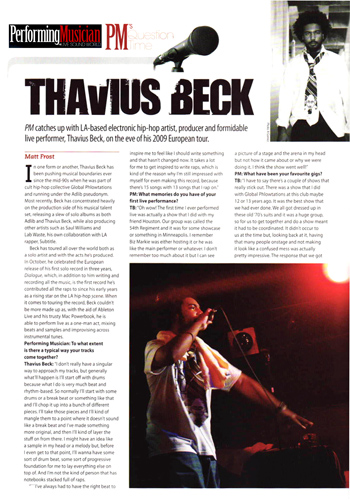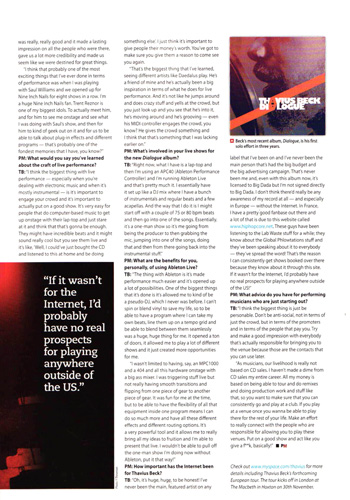

QUESTION TIME
PM catches up with LA-based electronic hip-hop artist, producer and formidable live performer, Thavius Beck, on the eve of his 2009 European tour.
In one form of another, Thavius Beck has been pushing musical boundaries ever since the mid-90s when he was part of cult hip-hop collective Global Phlowtations and running under the Adlib pseudonym. Most recently, Beck has concentrated heavily on the production side of his musical talent set, releasing a slew of solo albums as both Adlib and Thavius Beck, while also producing other artists such as Saul Williams and Lab Waste, his own collaboration with LA rapper, Subtitle.
Beck has toured all over the world both as a solo artist and with the acts he's produced. In October, he celebrated the European release of his first solo record in three years, Dialogue, which in addition to him writing and recording all the music, is the first record he's contributed all the raps to since his early years as a rising star on the LA hip-hop scene. When it comes to touring the record, Beck couldn't be more made up as, with the aid of Ableton Live and his trusty Mac Powerbook, he is able to perform live as a one-man act, mixing beats and samples and improvising across instrumental tunes.
Performing Musician: To what extent is there a typical way your tracks come together?
Thavius Beck: "I don't really have a singular way to approach my tracks, but generally what'll happen is I'll start off with drums because what I do is very much beat and rhythm-based. So normally I'll start with some drums or a break beat or something like that and I'll chop it up into a bunch of different pieces and I'll kind of mangle them to a point where it doesn't sound like a break beat and I've made something more original, and then I'll kind of layer the stuff on from there. I might have an idea like a sample in my head or a melody but, before I even get to that point, I'll wanna have some sort of drum beat, some sort of progressive foundation for me to lay everything else on top of. And I'm not the kind of person that has notebooks stacked full of raps.
"I've always had to have the right beat to inspire me to feel like I should write something and that hasn't changed now. It takes a lot for me to get inspired to write raps, which is kind of the reason why I'm still impressed with myself for even making this record, because there's 15 songs with 13 songs that I rap on."
PM: What memories do you have of your first live performance?
TB: "Oh Woe! The first time I ever performed live was actually a show that I did with my friend Houston. Our group was called the 54th Regiment and it was for some showcase or something in Minneapolis. I remember Biz Markie was either hosting it or he was like the main performer or whatever. I don't remember too much about it but I can see a picture of a stage and the arena in my head but not how it came about or why we were doing it. I think the show went well!"
PM: What have been your favorite gigs?
TB: "I have to say there's a couple of shows that really stick out. There was a show that I did with Global Phlowtations at this club maybe 12 or 13 years ago. It was the best show that we had ever done. We got all dressed up in these old '70's suits and it was a huge group, so for us to get together and do a show meant it had to be coordinated. It didn't occur to us at the time but, looking back at it, having that many people onstage and not making it look like a confused mess was actually pretty impressive. The response that we got was really, really good and and it made a lasting impression on all the people who were there, gave us a lot more credibility and made us seem like we were destined for great things.
"I think that probably one of the most exciting things I've done in terms of performance was when I was playing with Saul Williams and we opened up for Nine Inch Nails for eight shows in a row. I'm a huge Nine Inch Nails fan. Trent Reznor is one of my biggest idols. To actually meet him, and for him to see me onstage and see what I was doing with Saul's show, and then for him to kind of geek out on it and for us to be able to talk about plug-in effects and different programs - that's probably one of the fondest memories that I have, you know?"
PM: What would you say you've learned about the craft of live performance?
TB: "I think the biggest thing with live performance - especially when your dealing with electronic music and when it's mostly instrumental - is it's important to engage your crowd and it's important to actually put on a good show. It's very easy for people that do computer-based music to get up onstage with their lap-top and just stare at it and think that's going to be enough. They might have incredible beats and it might sound really cool but you see them live and it's like, 'Well, I could've just bought the CD and listened to this at home and be doing something else'. I just think it's important to give people their money's worth.
You've got to make sure you give them a reason to come and see you again.
"That's the biggest thing that I've learned, seeing different artists like Daedelus play. He's a friend of mine and he's actually been a big inspiration in terms of what he does for live performance. And it's not like he jumps around and does crazy stuff and yells at the crowd, but you just look up and see that he's into it, he's moving around and he's grooving - even his MIDI controller engages the crowd, you know? He gives the crowd something and I think that's something I was lacking earlier on."
PM: What's involved in your live shows for the Dialogue album?
TB: "Right now, what I have is a lap-top and then I'm using an APC40 (Ableton Performance Controller) and I'm running Ableton Live and that's pretty much it. I essentially have it set up like a DJ mix where I have a bunch of instrumentals and regular beats and a few acapellas. And the way that I do it is I might start off with a couple of 75 or 80 bpm beats and then go into one of the songs. Essentially, it's a one man show so it's me going from being the producer to then grabbing the mic, jumping into one of the songs, doing that and then from there going back into the instrumental stuff."
PM: What are the benefits for you personally, of using Ableton Live?
TB: "The thing with Ableton is it's made performance much easier and it's opened up a lot of possibilities. One of the biggest things that it's done is it's allowed me to kind of be a pseudo-DJ, which I never was before. I can't spin or blend vinyl to save my life, so to be able to have a program where I can take my own beats, line them up on a tempo grid and able to blend between them seamlessly was a huge, huge thing for me. It opened a ton of doors, it allowed me to play a lot of different shows and it just created more opportunities for me.
"I wasn't limited to having, say, an MPC 1000 and a 404 and all this hardware onstage with a big ass mixer. I was triggering stuff live but not really having smooth transitions and flipping from one piece of gear to another piece of gear. It was fun for me at the time, but to be able to have the flexibility of all that equipment inside one program means I can do so much more and have all these different effects and different routing options. It's a very powerful tool and it allows me to really bring all my ideas to fruition and I'm able to present that live. I wouldn't be able to pull off the one-man show I'm doing now without Ableton, put it that way!"
PM: How important has the Internet been for Thavius Beck?
TB: "Oh, it's huge, huge to be honest! I've never been the main, featured artist on any label that I've been on and I've never been the main person that's had the big budget and the big advertising campaign. That's never been me and, even with this album now, it's licensed to Big Dada but I'm not signed directly to Big Dada. I don't think there'd really be any awareness of my record at all - and especially in europe - without the Internet. In France, I have a pretty good fanbase out there and a lot of that is due to this website called www.hiphopcore.net. These guys have been listening to the Lab Waste stuff for a while; they know about the Global Phlowtations stuff and they've been speaking about it to everybody - they've spread the word! That's the reason I can consistently get shows booked over there because they know about it through this site. If is wasn't for the Internet, I'd probably have no real prospects for playing anywhere outside the US!"
PM: What advice do you have for performing musicians who are just starting out?
TB: "I think the biggest thing is just to be personable. Don't be anti-social, not in terms of just the crowd, but in terms of the promoters and in the terms of the people that pay you. Try and make a good impression with everybody that's actually responsible for bringing you to the venue because those are the contacts you can use later.
"As musicians, our livelihood is really not based on CD sales. I haven't made a dime from CD sales my entire career. All my money is based on being able to tour and do remixes and doing production work and stuff like that, so you want to make sure that you can consistently go and play at a club. If you play a venue once you wanna be able to play there for the rest of your life. Make an effort to really connect with the people who are responsible for allowing you to play these venues. Put on a good show and act like you give a f**k, basically!"
Check out www.myspace.com/thavius for more details including Thavius Beck's forthcoming European tour. The tour kicks off in London at The Macbeth in Hoxton on 30th November.
MATT FROST